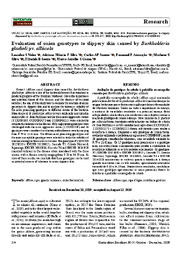Evaluation of onion genotypes to slippery skin caused by Burkholderia gladioli pv. alliicola.
Evaluation of onion genotypes to slippery skin caused by Burkholderia gladioli pv. alliicola.
Author(s): VELEZ, L. S.; SILVA, A. M. F.; SANTOS, C. A. F.; ASSUNÇÃO E. F.; SILVA, M. S.; SOUZA, E. B.; GAMA, M. A. S.
Summary: Onions (Allium cepa) slippery skin caused by Burkholderia gladioli pv. alliicola is one of the bacterial diseases that stand out in producing regions of the Brazilian Northeast. Given the importance and potential threat of this disease, and the absence of resistant varieties, the aim of this study was to evaluate the reaction of onion genotypes to slippery skin and to analyze the tolerance stability of the most promising genotypes to different strains of the bacteria. Nine strains of B. gladioli pv. alliicola were artificially inoculated in onion bulbs cv. Baia Periforme and the three most aggressive strains (CCRMBG39, CCRMBG172 and CCRMBG212) were selected to evaluate the tolerance to the disease. Fifty-eight onion genotypes were challenged with the most aggressive strain (CCRMBG39) and 34 genotypes were considered as tolerant, with a disease severity varying from 9.79 to 13.42 mm. The fifteen most promising genotypes and the most susceptible genotype were selected to study the stability of tolerance using the three selected strains. The genotypes F2 (EHCEB 20151030 x EHCEB 20133015), Cascuda T5, Crioula Mercosul, Juporanga, EHCEB 20111036, Cascuda T6 and EHCEB 20142028 remained tolerant to the disease when inoculated with the three strains, with a disease severity ranging from 9.13 to 14.19 mm. In view of these results, we conclude that these genotypes can be used as potential sources of tolerance to onion slippery skin.
Publication year: 2020
Types of publication: Journal article
Unit: Embrapa Semi-arid Region
Observation
Some of Embrapa's publications are published as ePub files. To read them, use or download one of the following free software options to your computer or mobile device. Android: Google Play Books; IOS: iBooks; Windows and Linux: Calibre.
Access other publications
Access the Agricultural Research Database (BDPA) to consult Embrapa's full library collection and records.
Visit Embrapa Bookstore to purchase books and other publications sold by Embrapa.

